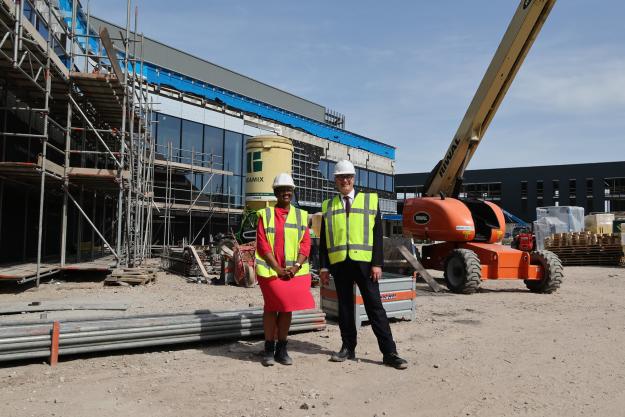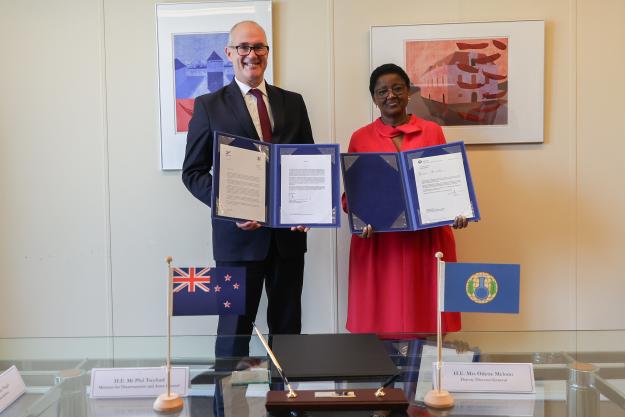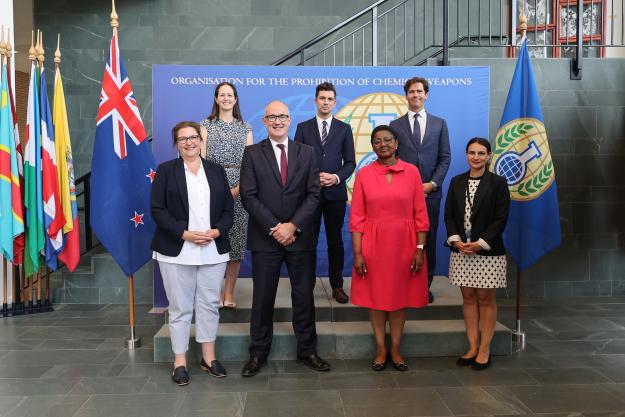
Hon Mr Phil Twyford, Minister for Disarmament and Arms Control of New Zealand, and H.E. Ms Odette Melano, Deputy Director-General of the OPCW
THE HAGUE, Netherlands—20 June 2022—The Minister for Disarmament and Arms Control of New Zealand, Hon Mr Phil Twyford, met on Friday, 17 June 2022 with the Deputy Director-General of the Organisation for the Prohibition of Chemical Weapons (OPCW), H.E. Ambassador Odette Melono, at OPCW Headquarters in The Hague.
The Deputy Director-General briefed the Minister on the achievements of the Organisation in the 25 years since the entry-into-force of the Chemical Weapons Convention, as well current challenges. She further explained the Organisation’s efforts to prevent the re-emergence of chemical weapons, strengthen the protection and response capabilities of Member States, and support the peaceful use of chemistry for economic and technological development.
The two officials also visited the site of the future OPCW Centre for Chemistry and Technology (“ChemTech Centre”), which will enhance the capability of the Organisation to respond to chemical threats and to provide capacity building trainings for Member States. The ChemTech Centre is currently being built in an area just outside The Hague, with construction expected to complete by the end of 2022.

During the visit, the Minister also announced additional voluntary contributions to two Trust Funds supporting the work of the OPCW:
- NZD 100,000 will support the OPCW Trust Fund for the Implementation of Article X (assistance and protection) in its ongoing assistance and protection programmes, with priority placed on providing assistance and protection to Ukraine in the case of the threat or use of chemical weapons.
- NZD 80,000 will support the OPCW Trust Fund for Security and Business Continuity to increase the resilience of physical and cyber security of OPCW infrastructure and business continuity
Minister Twyford stated: “I am delighted to be here today to underscore the OPCW’s important mission to implement the provisions of the Chemical Weapons Convention and achieve a world free of chemical weapons. I am honoured to announce two voluntary contributions to support the work of this important chemical weapons watchdog, totalling NZD 180,000.
Aotearoa New Zealand is committed to disarmament and is confident that the new ChemTech Centre will enable the OPCW to future-proof its work, respond to the concerning re-emergence of chemical weapons, and enhance international cooperation. Being here today, I can see how the Centre is coming together quickly and will soon be ready to take up its important tasks.”
Deputy Director-General Melono remarked: “New Zealand has been a long-standing supporter of the Chemical Weapons Convention. Its contributions to the future ChemTech Centre, as well as the additional voluntary contributions pledged today, signal New Zealand’s firm commitment in upholding the global norm against chemical weapons.”

Background
New Zealand has been an active member of the OPCW since the Chemical Weapons Convention entered into force in 1997.
The project to build the ChemTech Centre seeks to strengthen the OPCW’s capabilities to fully address new and emerging chemical weapons threats. The new facility will be used to meet the demands of OPCW Member States for enhanced verification tools, improved detection capabilities and response measures, as well as increased capacity building activities. New Zealand has contributed €200,000 to the construction of the ChemTech Centre.
As the implementing body for the Chemical Weapons Convention, the OPCW, with its 193 Member States, oversees the global endeavour to permanently eliminate chemical weapons. Since the Convention’s entry into force in 1997, it is the most successful disarmament treaty eliminating an entire class of weapons of mass destruction.
Over 99% of all declared chemical weapon stockpiles have been destroyed under OPCW verification. For its extensive efforts in eliminating chemical weapons, the OPCW received the 2013 Nobel Peace Prize.
